Case Study
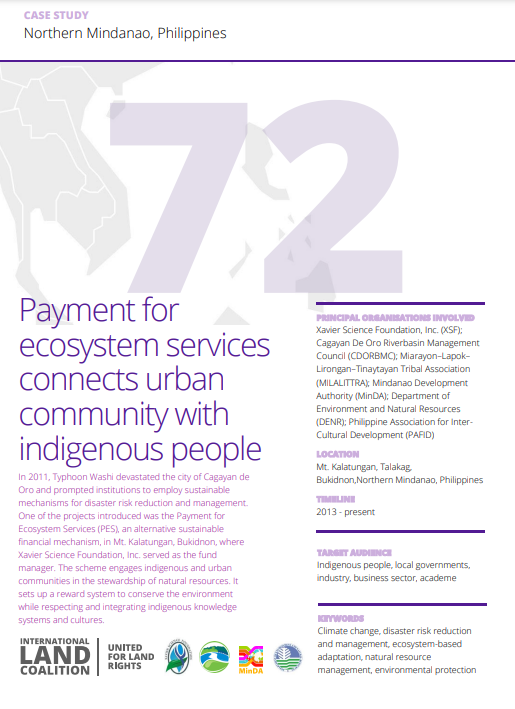
Payment for Ecosystem Services Connects Urban Community With Indigenous People
2016
Author(s): International Land Coalition
In 2011, Typhoon Washi devastated the city of Cagayan de Oro and prompted institutions to employ sustainable mechanisms for disaster risk reduction and management. One of the projects introduced was the Payment for Ecosystem Services (PES), an alternative sustainable financial mechanism, in Mt. Kalatungan, Bukidnon, where Xavier Science Foundation, Inc. served as the fund manager.

Sustainable Forest Management Ties Indigenous Group Together Against Eviction Threats
2016
Author(s): International Land Coalition
In order to oppose logging activities in their territories (ongoing since 1968) and an attempt of eviction by the State (in 1992), the indigenous people of Huay Hin Lad Nai village, Northern Thailand, have established traditional forest management techniques and institutions, set up the Northern Farmer’s Network (NFN), and adopted a sustainable land and forest use planning system.
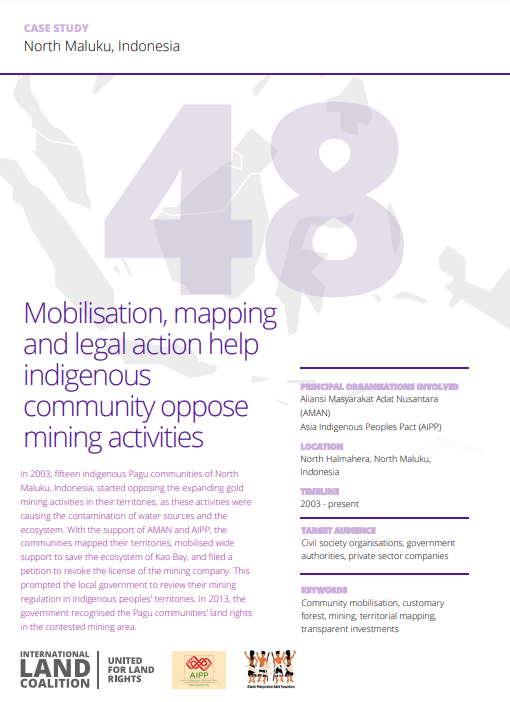
Mobilisation, Mapping and Legal Action Help Indigenous Community Oppose Mining Activities
2017
Author(s): International Land Coalition
In 2003, fifteen indigenous Pagu communities of North Maluku, Indonesia, started opposing the expanding gold mining activities in their territories, as these activities were causing the contamination of water sources and the ecosystem.

Las Kuatras Marias farm is located in San Narcisso village, near Victoria City in Oriental Mindoro, Philippines, where rice monoculture is the main source of income for family farmers in the area. Applying an extensive knowledge of indigenous and organic practices, the farm is strategically structured in distinct components that are designed to maximize one another.
Free, Prior and Informed Consent: A Successful Process of Dialogue and Co-Decision-Making With and For Panama’s Indigenous Peoples
2020
Author(s): Food and Agriculture Organization of the United Nations
In this context, FAO is executing a project to support 19 communities belonging to six of the seven existing indigenous peoples in the country, which is financed by the Ministry of Government (MINGOB), with the support of the Ministry of Agricultural Development (MIDA) and the participation of the 12 indigenous congresses and councils.

The Hands Behind a Cup of Coffee in Panama: Sustainable Coffee Production Techniques Build on Indigenous Peoples’ Traditional Knowledge
2023
Author(s): Food and Agriculture Organization of the United Nations
The project is an initiative of the Inter-American Development Bank (IDB) with funding from the Japan Special Fund Poverty Reduction Program. It was implemented with the technical assistance of the Food and Agriculture Organization of the United Nations (FAO) and with the support of Panama’s Ministry of Agricultural Development, as well as coffee company, Café Durán.
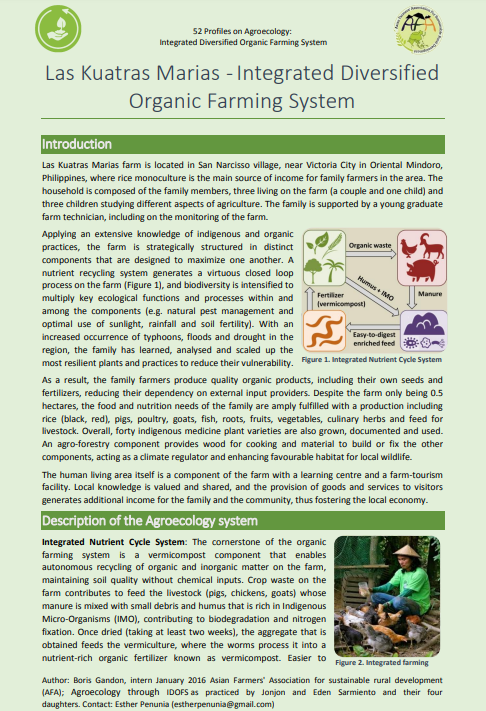
Las Kuatras Marias - Integrated Diversified Organic Farming System
2016
Author(s): Gandon B
Las Kuatras Marias farm is located in San Narcisso village, near Victoria City in Oriental Mindoro, Philippines, where rice monoculture is the main source of income for family farmers in the area. Applying an extensive knowledge of indigenous and organic practices, the farm is strategically structured in distinct components that are designed to maximize one another.
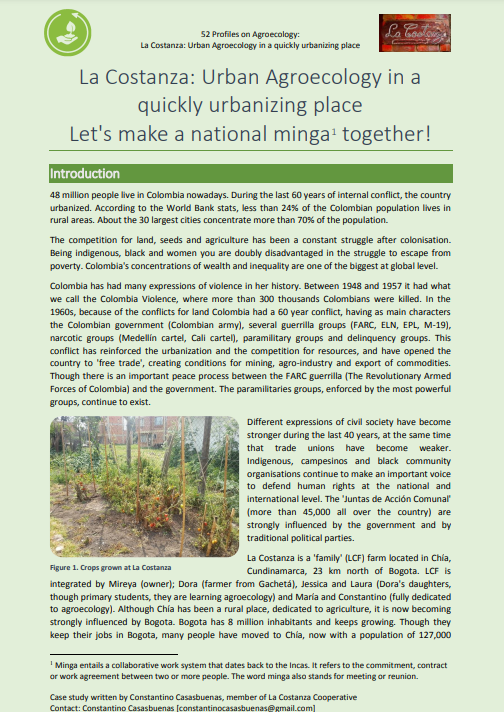
La Costanza: Urban Agroecology In a Quickly Urbanizing Place Let's Make a National Minga Together!
2016
Author(s): Casasbuenas C
The competition for land, seeds and agriculture has been a constant struggle after colonisation. Being indigenous, black and women you are doubly disadvantaged in the struggle to escape from poverty. Colombia's concentrations of wealth and inequality are one of the biggest at global level.
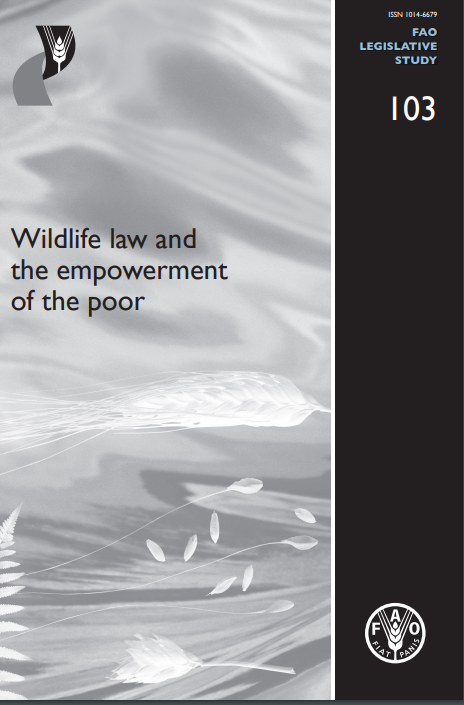
This study is a guide for those looking to improve national wildlife laws with a view to ensuring environmental sustainability and strengthening the role of disadvantaged people and increasing their participation in the sharing of benefits.Wildlife management is the process of keeping populations, wildlife including endangered species, at desirable levels using scientific, technical and traditional knowledge.
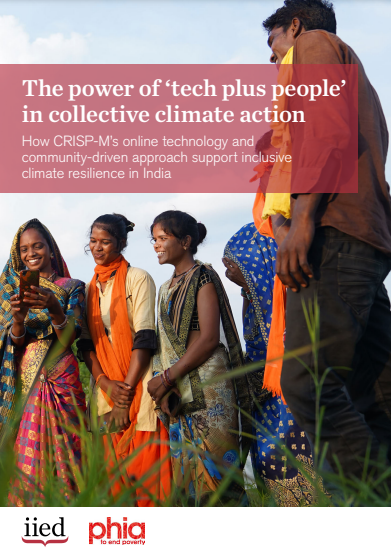
The Power of ‘Tech Plus People’ in Collective Climate Action :How CRISP-M’s Online Technology and Community-Driven Approach Support Inclusive Climate Resilience in India
2022
Author(s): Bharadwaj R, Abhilashi R, Kaur D, Kumar A
These 12 case studies demonstrate how our ‘tech plus people’ approach is supporting bottom-up, village-level climate resilience planning that includes the most marginalised groups. Together, these examples offer emerging lessons and trends that can inform plans to scale up climate tech in India and beyond.



